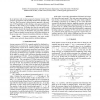Free Online Productivity Tools
i2Speak
i2Symbol
i2OCR
iTex2Img
iWeb2Print
iWeb2Shot
i2Type
iPdf2Split
iPdf2Merge
i2Bopomofo
i2Arabic
i2Style
i2Image
i2PDF
iLatex2Rtf
Sci2ools
103
click to vote
ICASSP
2011
IEEE
2011
IEEE
System-theoretic formulation and analysis of dynamic consensus propagation
In our previous work we have proposed a dynamic version of the consensus propagation (CP) algorithm introduced by Moallemi and Van Roy. Here, we pursue a system theoretic approach to the analysis of CP. Specifically, we first develop a state-space model for CP and then use this model to prove stability of CP when applied to time-varying processes. We further show how the state-space model can be used to describe the transfer characteristics (spatio-temporal filtering) of CP in terms of attenuation and group delay, both for pure CP and an extended version that uses local linear predictors at the processing nodes. Numerical simulations illustrate our findings.
Related Content
| Added | 20 Aug 2011 |
| Updated | 20 Aug 2011 |
| Type | Journal |
| Year | 2011 |
| Where | ICASSP |
| Authors | Valentin Schwarz, Gerald Matz |
Comments (0)

